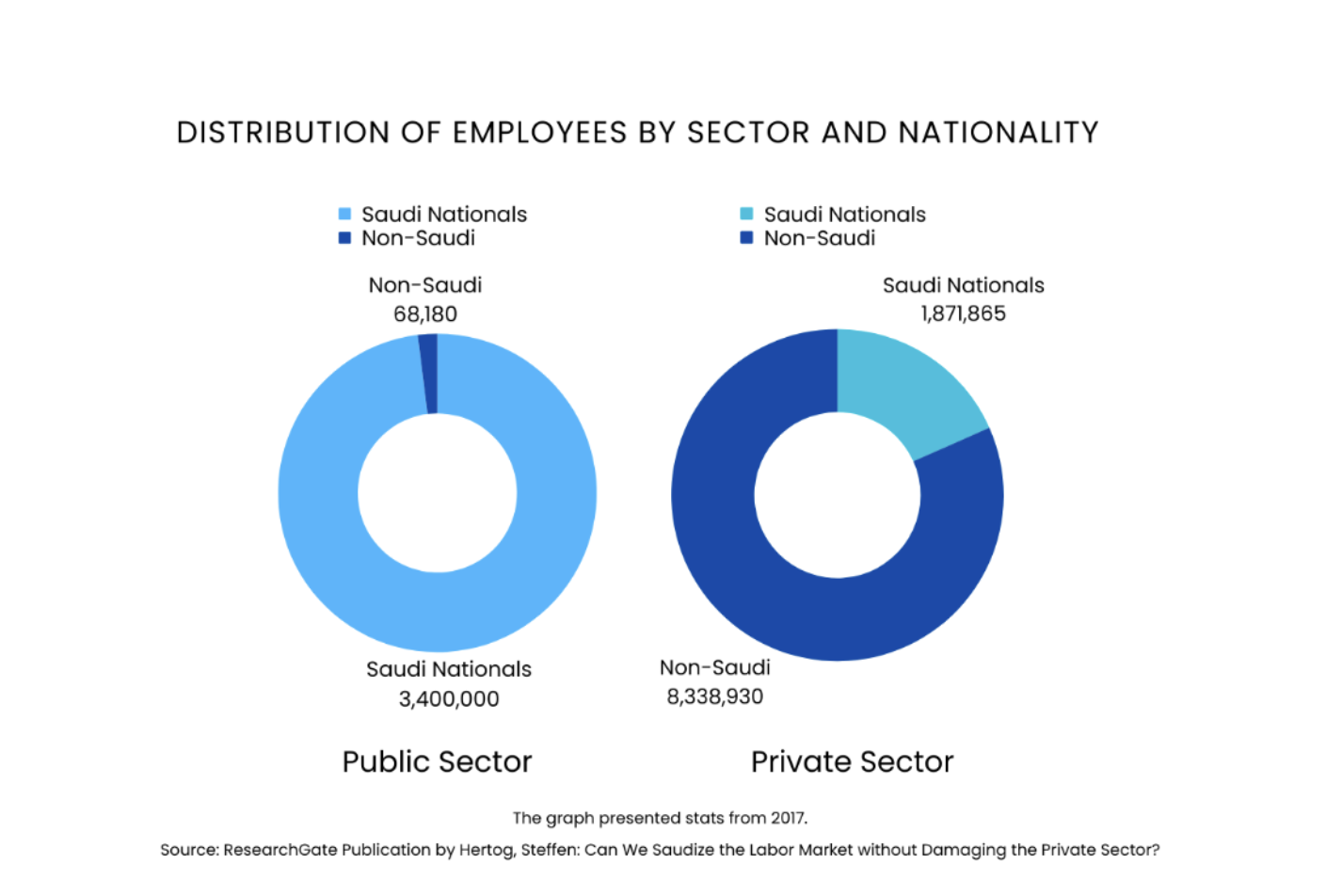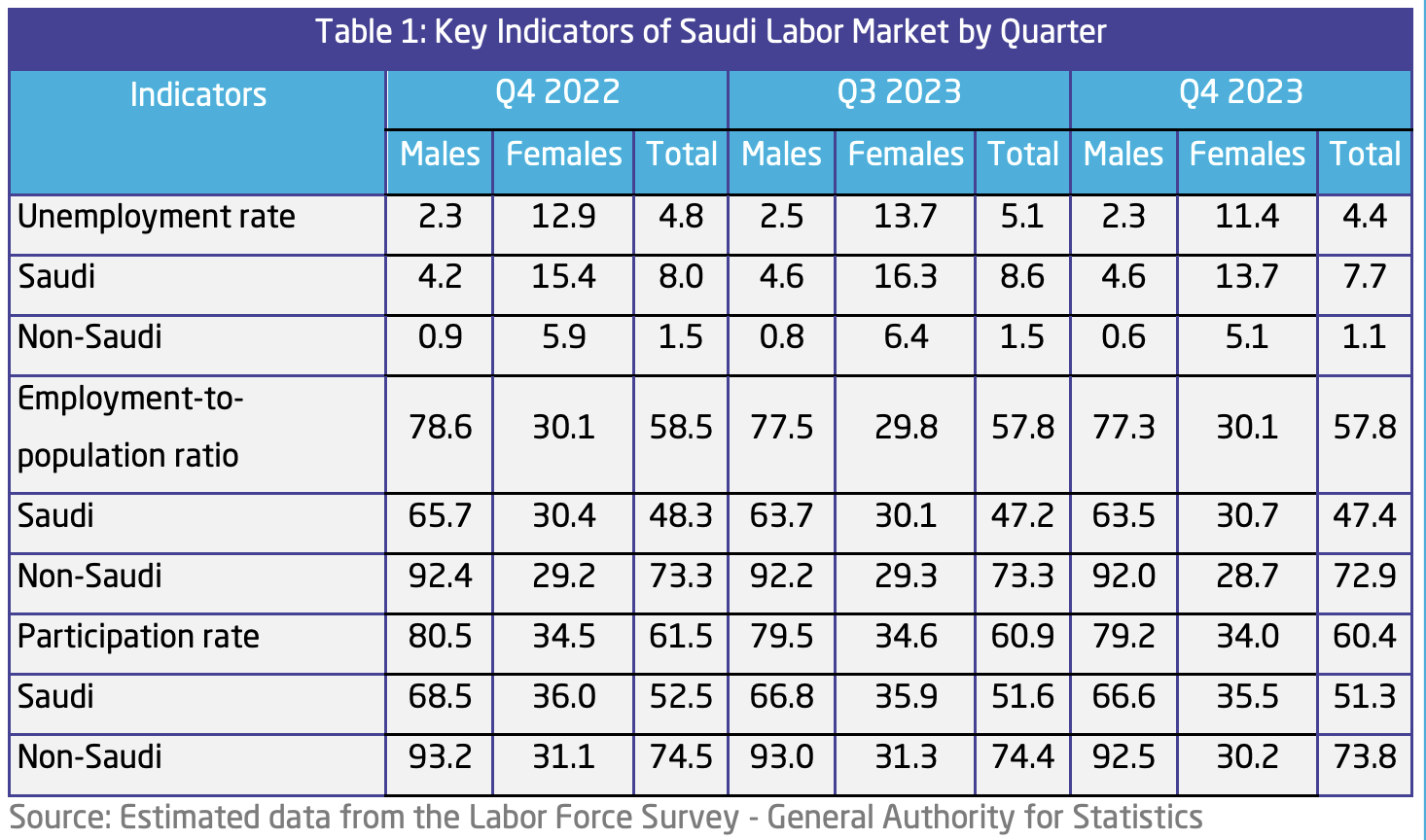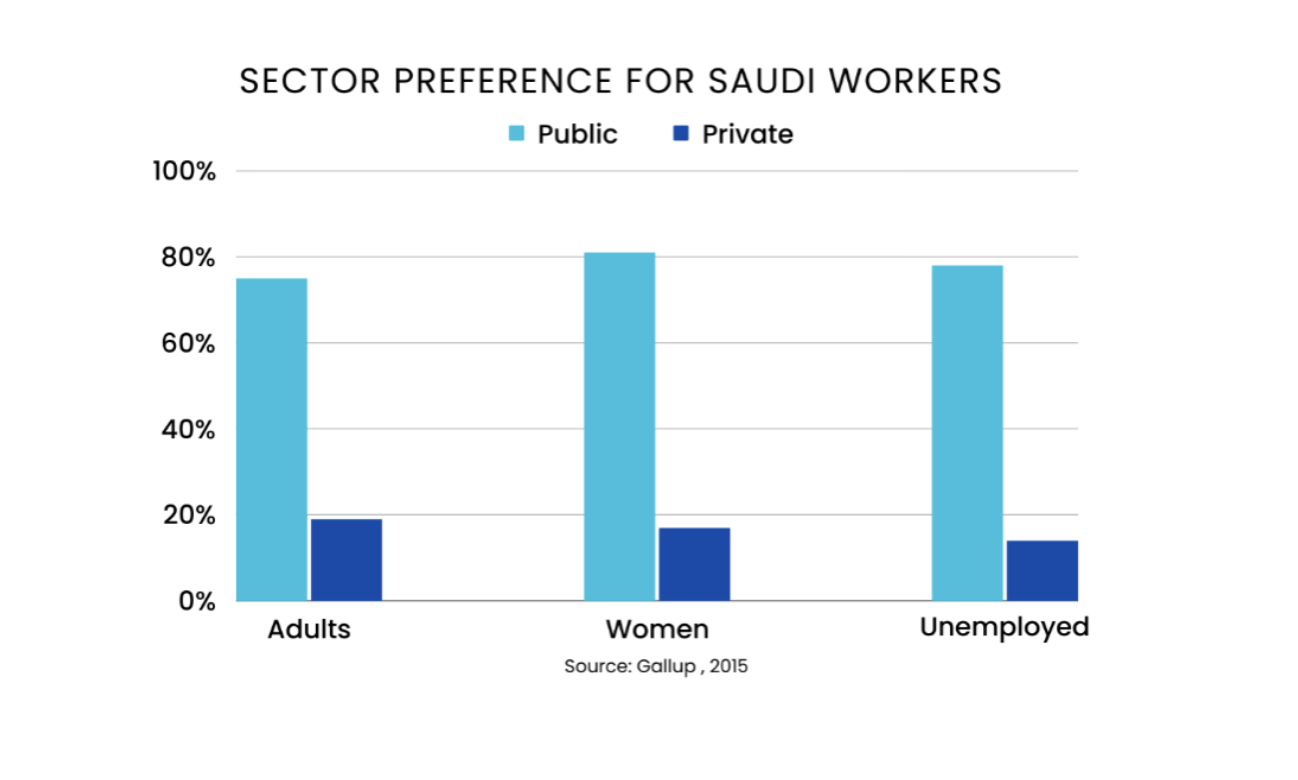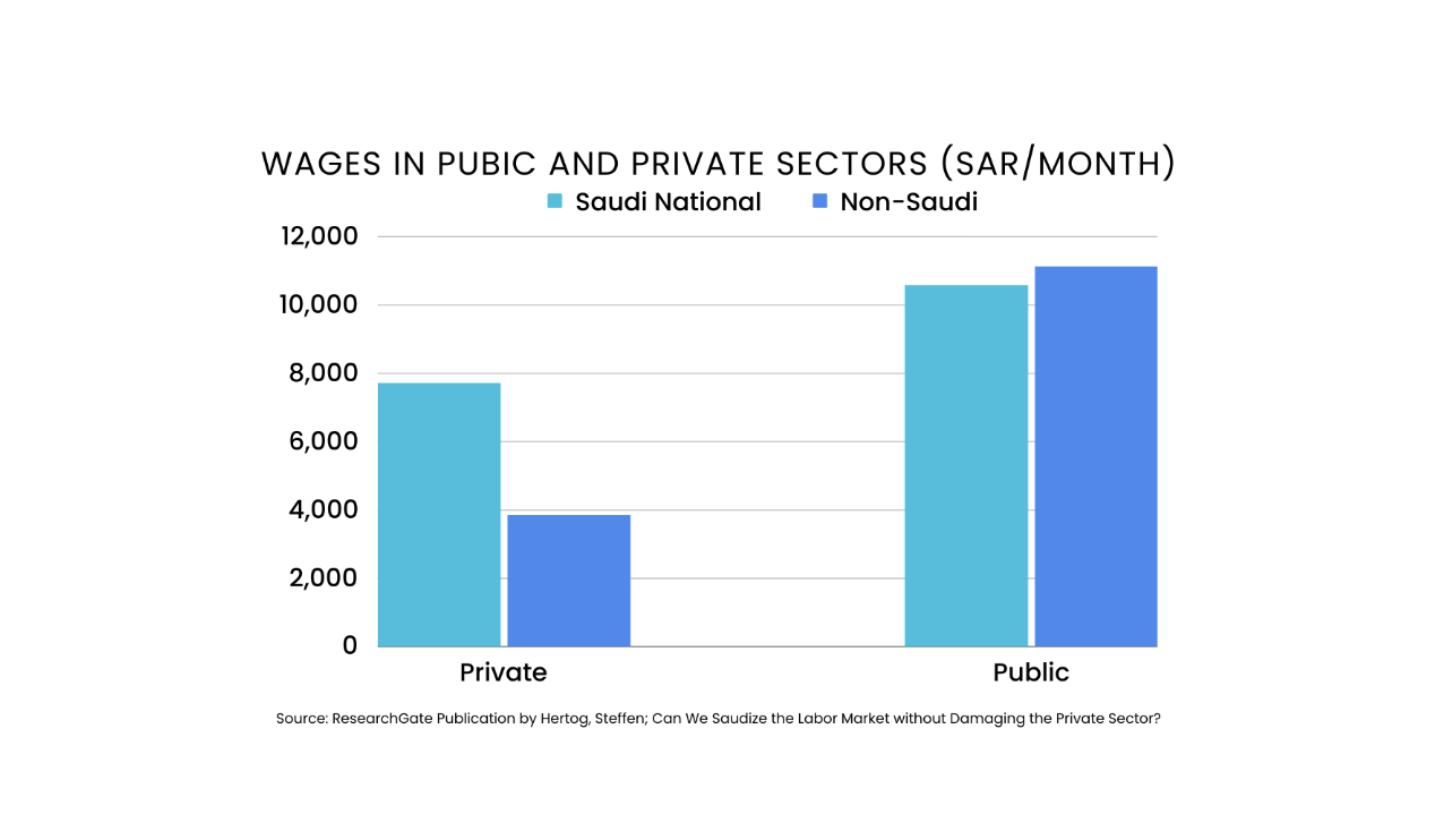Saudi Arabia has been undergoing a transformative journey in recent years, followed by ambitious economic reforms and a vision for a diversified, knowledge-based economy.
A key component of this vision is the development and retention of young Saudi talent in the private sector which is a challenge for employers and HR professionals. Achieving the country’s Vision 2030 objectives and maintaining sustainable economic growth depends heavily on keeping the brightest minds in the country. To equip businesses with practical insights that actually make a difference in retaining talent for at least two years, we will dive into some realistic stats and strategies for retaining young Saudi professionals in the private sector
In the ever-evolving private sector of the Kingdom, non-Saudi nationals play a crucial role, contributing significantly to the complex workforce dynamics. According to the Labor Force Survey by the General Authority for Statistics (G Stats) a substantial part of the labor force constitutes non-Saudi professionals.


Deeper analysis from ResearchGate Publications also reveals a deep incongruity in the Saudi labour market. Interestingly, about two-thirds of the population works in the public sector, in comparison to the private sector, where foreign workers dominate the workforce. Saudi Arabia stands out on the international scene because of this exceptional situation, as developed and growing nations often have far lower rates of residents working in the public sector—typically less than one-fifth. However, in Saudi, the private sector is populated with non-nationals.
This unique scenario highlights the tremendous difficulty the private sector faces in keeping young, talented nationals in this diverse and changing environment., making it stand out as one of the biggest obstacles private businesses face in the Kingdom. It's noteworthy that non-Saudi nationals frequently make up a sizable share of the workforce which makes a huge difference in shaping the organizational landscape.
The significant presence of non-Saudi nationals in the private sector workforce brings both opportunities and challenges. While it enriches the workplace with diverse perspectives, skills, and cultural backgrounds, it demands Employers recognize the challenges in retaining Saudi young talent amidst an inclusive environment. While the interaction of different experiences makes for a lively workplace, it also calls for careful consideration to meet the unique requirements and goals of Saudi nationals.
Challenges For Retaining Local Talent in the Private Sector in Comparison of Public Sector
Transitioning into the challenges faced by HR professionals and employers in retaining young Saudi talent, One of the primary hurdles is the magnetic pull of the public sector, offering not only flexibility and job stability but also attractive benefits, work-life balance and competitive salaries. Gallup Survey in 2015 showed a compelling trend, highlighting the employment preferences of the Saudi workforce. 78% of the unemployed expressed a preference for public sector employment, with a reason for job security as their primary motivation. In stark contrast, a mere 14% indicated a preference for the private sector. To effectively retain talent, the private sector must strategically address these factors and adopt strategies to create an environment that competes with the allure of the public sector.

Strategies for Attracting and Retaining Young Saudi Talent
The urgent need for Saudi private sector companies to adopt effective talent retention strategies is underscored by a revealing survey. When asked whether their companies make efforts to retain employees, a majority, 43.5%, responded negatively, indicating a perceived lack of initiatives in this crucial aspect of talent retention. Furthermore, 22% expressed uncertainty about their companies' efforts, highlighting a lack of awareness or clarity on existing retention measures. Only 34.5% affirmed that their companies actively make efforts to retain their workforce.
This highlights a significant gap in human resources management practices within Saudi companies and urges them to enhance their retention efforts and invest in strategies that prioritize employee satisfaction and loyalty. Here, we delve into effective strategies that can empower employers and HR professionals to retain the top national talent.
1. Invest in Human Resources
One of the most important strategies for Saudi private-sector organizations to retain talent is investing in Human Resources (HR). Investing in a strong HR infrastructure helps businesses run successful recruitment, development, and retention initiatives.
This requires making investments in cutting-edge HR technology to expedite operations, putting in place extensive training and development plans to advance staff members' skill sets, and launching potent employee engagement campaigns. Strategic and well-funded HR practices show a dedication to the growth and well-being of workers, which is important for retaining talent in the competitive Saudi market.
Investing in HR and your employees can look like increasing engagement from your teams, planning company trips and outings, investing in health and wellness benefits for employees, providing valuable resources for staff or creating a development program that explores competencies, knowledge gaps, and highlights future learning opportunities.
2. Competitive Compensation Benefits Beyond Salary
One of the most important components of the larger plan to draw and keep elite talent in the Saudi private sector is setting up competitive compensation packages.
This entails more than just paying great salaries; it also includes an all-encompassing approach to compensation that respects workers' abilities and contributions while still conforming to industry norms. That's not to say better pay doesn't equate to talent retention. In fact, research by Steffen Hertog, professor at the London School of Economics reveals that the public sector offers higher salaries than the private sector, which plays a part in the sector's ability to attract Saudi candidates.

Offering a competitive base pay, performance-based bonuses, and a comprehensive benefits package plays a major role in employee retention.
3. Tailored Career and Development Opportunities
In Saudi's private sector, fostering a dynamic and growth-oriented work environment requires offering possibilities for professional and personal advancement.
This means putting formal professional development programs in place, as well as mentorship programs, and chances for ongoing education to empower staff members. The promotion of concepts like entrepreneurial thinking, internal career mobility, and competitive financial perks all support employee retention and job satisfaction. Together with educational collaborations, diversity and inclusion initiatives, and other activities, these programs foster an atmosphere where candidates can thrive and see themselves in a position of advancement and fulfillment inside the company for the longer term.
4. Digital Transformation and New Technology Integrations
Great employers help their employees optimize workflow and perform at their highest levels to achieve their goals. A productive and technologically advanced work environment has become central to an employees success and ultimately an employers ability to attract and retain candidates.
When companies embrace and integrate cutting-edge technologies, whether through digital transformation or tools to enhance communication and collaboration, the outcome is a more competitive edge over the competition. Expertise in technology indicates that young people prefer to work in environments that make use of cutting-edge equipment and software.
This not only boosts output but also establishes the company as a forward-thinking place to work, creating an environment where staff members can use technology to further their careers and make noteworthy contributions to the goals of the business.
Enhanced technology solutions in the workplace might look like:
- Cloud based solutions and platforms to keep data organized and updated in real-time
- Communication tools like Slack, that allow feedback, questions or specific tasks to be communicated instantly over informal messages
- More advanced technical hardware with large amounts of storage and better displays
- Project Management tools that help everyone on the team streamline their tasks and stay on top of their specific projects
5. Job Security and Wellness Programs
In today's world, top candidates recognize that their time in primarily spent at the office, and their sense of purpose and well-being is heavily tied to the workplace.
More than ever, employees have to play a strong role in positive physical and mental health reinforcements. And since wellness can mean something different for everyone, employers must find ways to be flexible with their offerings and adapt to their target candidates group's needs.
Businesses fostering an environment where employees feel valued and nourished create dedicated long-term employees who are happier and more productive.
There are 5 components of well-being that comprise a holistic view of your employee which are: their current role, physical health, welcoming colleagues, financial security and positive relationships and community.
Some ideas to foster employee wellness include:
- Flexible working hours: This includes work from home options or alternative flexible arrangements.
- Paid time off: In order to be most productive your team needs their rest to prevent them from burnout. PTO packages or unlimited time-off means that employees have the opportunity to step back when things are overwhelming so they can come back refreshed and ready to succeed.
- Healthy snacks or fitness benefits: Wellness initiatives like office challenges, paid fitness benefits or healthy snacks can promote a healthy lifestyle for employees.
Whether it's work-life balance, mental health programs or job security, wellness efforts that simultaneously improve employee satisfaction and contentment lead to reduced churn and more productive employees. These strategic actions not only promote the well-being of individual employees but also increase the likelihood of keeping valuable staff.
6. Employee Engagement and Transparent Communication
Encouraging employee involvement and open communication are critical to keeping young Saudi talent. Engagement is increased when workers are actively involved in decision-making processes, have their contributions acknowledged, and are given the feeling of a sense of belonging.
Keeping management to employee lines of communication open guarantees that staff members are aware of company objectives, modifications, and advancement prospects. These actions not only improve the relationship between the company and its youthful personnel, but they also foster an environment at work that emphasizes openness and teamwork, which helps retain brilliant workers.
7. Inspire Talent by Highlighting Success Stories
Presenting success stories and emphasizing the results of both individual and group efforts is a powerful tactic for keeping young talent.
Acknowledging and applauding successes fosters a culture of gratitude in addition to raising spirits. Organizations can instill a sense of pride and inspiration in their employees and strengthen their sense of connection to the company's mission and goals by regularly sharing success stories. As a result of feeling appreciated and recognized for their achievements, employees not only help to create a great work atmosphere but also act as a potent talent retention strategy.
All in all, effectively combining knowledge and action is crucial for talent retention. Employers and HR professionals in Saudi Arabia can create an environment that attracts young Saudi talent and encourages them to not just join the company but stay for the long-term. These strategies, which are supported by data and driven by persuasive tactics, ensure that companies become more than just places of employment; they also cultivate a culture of innovation, growth, and enduring dedication.
If you are ready to expand your business to Saudi Arabia, Localized is here to give you a helping hand. Ensuring your Saudi talent pipeline is full, and your company enjoys the benefits of being a Nitaqat Platinum status organization.
Recruiting on Localized allows employers to connect with, source, and hire top-quality Saudi Nationals through a single source.
Request a Demo today and learn why Fortune 500 companies trust Localized to help them find talent in KSA and across EMEA.
